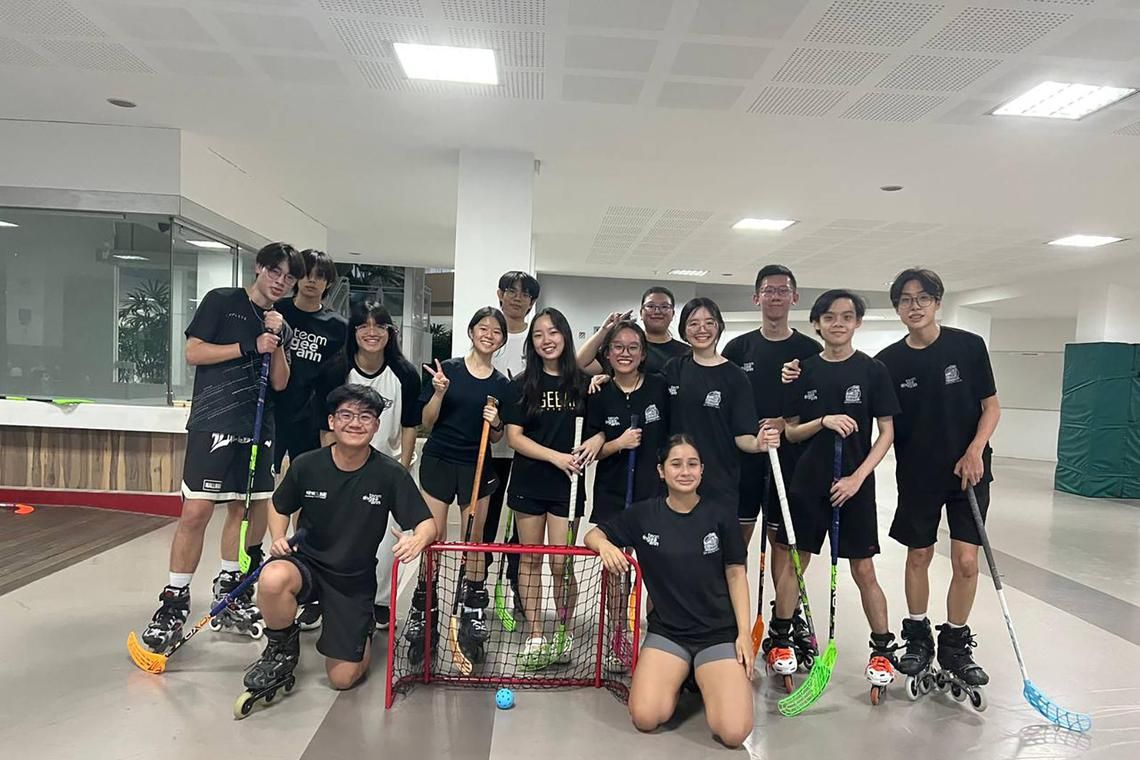At the Singapore Inline Skating Tournament in July 2024, two competitors battled for third place in a best-of-three-round face-off.
In one lane stood Mr Cedric Ong, 20, in his first competition. He was up against Mr Hadrien Hwang, 18, who had been skating for almost a decade since primary school.
They are both members of Ngee Ann Polytechnic’s Inline Skating Club (NP Inline).
Their event that day: the speed slalom, where athletes dash forward for 12m to the first cone, before lifting one leg and weaving through a line of 20 cones in a zig-zag pattern, in the fastest time possible.
Mr Hwang won but Mr Ong was not fazed by the result, saying: “There will be good and very good skaters, but no one will judge you for trying, because everyone starts somewhere.”
He only picked up inline skating in NP in 2022, persuaded by a secondary-school friend who also went to the polytechnic. Mr Ong is currently vice-president of the CCA.
Of the roughly 140 students who join the CCA each year, about 40 per cent do not have skating experience. They are divided into beginner, intermediate and advanced groups for training.
The advanced skaters learn basic skills in the classic slalom category, as an introduction to competitive skating, before they branch off to their specialisations.
Newcomers – and intermediate skaters who have not fully mastered the fundamentals – are guided by the CCA’s coach Terence Cheung, 35, who is also the head coach at Ernsports Skating Academy, a local rollersports school. They learn to stand on their skates and control both skates to turn and stop, among other things.
With five months of training, the newcomers get to put these skills to the test, skating from the National Stadium to Marina Bay Sands at the annual NPInline Urban, a public event organised by NP Inline that is held in October.
Despite the challenges of tackling unfamiliar terrain, many of the beginners are determined to finish the 6.3km route, said Ms Iren Grant, president of NP Inline.
She remembers a member who bought an old pair of skates that was one and a half size too big for her. “She fell down about 20 times, once even falling into the splits,” said Ms Grant. But the girl pushed through the pain and managed to skate all the way to the first checkpoint.
Once the beginners are confident in their fundamentals, they move on to specialised events, which include speed slalom, slide and classic slalom.

Mr Cedric Ong, 20, competing in the Speed Slalom category at the Singapore Inline Skating Tournament (SIT) 2024.PHOTO: COURTESY OF CEDRIC ONG
In slide competitions, sliders are given five rounds to sprint forward and glide across a mat, using a different stopping technique each round. Their best four slides are graded, based on technical difficulty, the skidding distance across the mat and the person’s form.
Mr Poh Jun Wei, 19, who has been training with NP Inline’s sliders since July last year, loves the “adrenaline rush” from executing a challenging move.
Injuries are par for the course. “While I was trying to perfect this move called the backslide, where one leg is lifted into the air, I missed some of the steps required for the trick, which caused me to fall forward and land on my elbows on the rough basketball court ground,” he said, showing his scars.
Another member, Mr Sky Tay, 20, competes in both the slide and classic slalom events. In classic slalom, participants perform tricks while skating between cones in a two-minute routine set to a song of their choice.
Those who compete in classic slalom are often choreographers of their own routines.
“This event is unique because it is more like a performance or a dance, and you can get very creative because there are almost 300 skills to choose from,” Mr Tay said.
Apart from training for competitions, members make time for bonding through playing inline floorball, which is floorball on inline skates.

At the annual NP Urban, a public skating event organised by NP Inline, members skate all the way from the National Stadium to Marina Bay Sands.PHOTO: COURTESY OF BRAYDEN WU
On Fridays, they stay back for an hour to do that, after regular training from 6pm to 8pm.
The sport, introduced in the tertiary categories of national competitions in 2024, is becoming increasingly popular among the polytechnic and university inline CCA community. NP Inline is forming a team for this year’s championships.
For Mr Ong, the bonds formed are part of what motivates him to train. He said: “No one forces you to come, but as you train and compete together, you meet a supportive group of friends that motivate you to come back every session, and soon enough this CCA would feel like family.”
Join ST’s WhatsApp Channel and get the latest news and must-reads.

